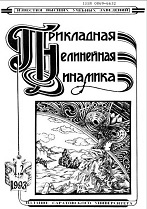|
This article is cited in 1 scientific paper (total in 1 paper)
NONLINEAR DYNAMICS AND NEUROSCIENCE
Measuring cognitive potential based on the performance of tasks of various levels of complexity
A. Yu. Petukhova, S. A. Polevayab
a Keldysh Institute of Applied Mathematics of RAS, Moscow, Russia
b National Research Lobachevsky State University of Nizhny Novgorod, Russia
Abstract:
Purpose of work. The article is devoted to the topic of measuring the cognitive potential of a person on the basis of the obtained experimental data in order to identify its potential capabilities, as well as to monitor their dynamics, for example, to diagnose recovery after an illness. This goal is divided in the study into two tasks, namely, to assess the cognitive potential, it is necessary to develop two algorithms: 1. Assessment of the level of cognitive complexity of tasks. 2. Systems of levels of cognitive potential for an individual. Methods. The basis of the methods is a set of experimental, including specially developed author’s, techniques, as well as mathematical methods for processing data and calculating the entered specific parameters to formalize the cognitive potential. Results. On the basis of these methods, methods (and specific formulas) are proposed for calculating the cognitive potential of an individual using experimental data and tasks of various levels of complexity. Conclusion. Within the framework of this study, a methodology for determining the value of cognitive potential was created on the basis of the theory of information images / representations, as well as a specially developed web-toolkit for objectifying cognitive skills (including the so-called softskills). This value can be useful, both in studies related to changes in cognitive abilities as a result of the influence of various internal and external factors (for example, learning, diseases, injuries, etc.), diagnostic goals (for example, with the aim of determining the speed recovery after a disease that affects cognitive activity, such as a stroke or SARS-CoV-2), and in the formation of requirements for certain work positions that significantly depend on the cognitive abilities of the individual.
Keywords:
cognitive potential, information images, representations, cognitive processes, Stroop test, Brain, target stimuli.
Received: 09.11.2021
Citation:
A. Yu. Petukhov, S. A. Polevaya, “Measuring cognitive potential based on the performance of tasks of various levels of complexity”, Izvestiya VUZ. Applied Nonlinear Dynamics, 30:3 (2022), 311–321
Linking options:
https://www.mathnet.ru/eng/ivp480 https://www.mathnet.ru/eng/ivp/v30/i3/p311
|

| Statistics & downloads: |
| Abstract page: | 86 | | Full-text PDF : | 148 | | References: | 20 |
|




 Contact us:
Contact us: Terms of Use
Terms of Use
 Registration to the website
Registration to the website Logotypes
Logotypes








 Citation in format
Citation in format 
